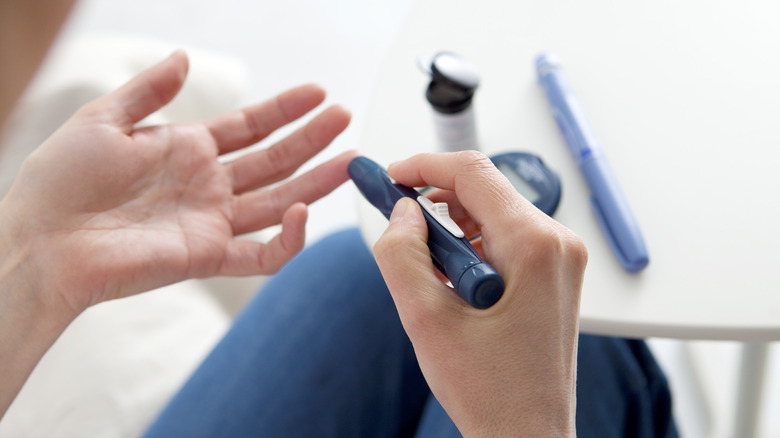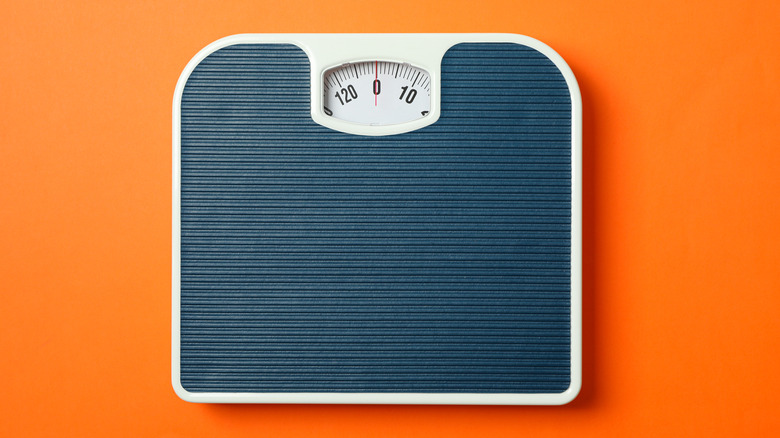Symptoms Of Diabetes You Shouldn't Ignore
Did you know that there's more than one type of diabetes and one of them only affects women? According to the Centers for Disease Control and Prevention (CDC), diabetes always has to do with blood sugar levels (glucose) and insulin, a hormone made by your pancreas that helps your body process and absorb sugar. However, if you have type 1 diabetes, your body is not producing enough insulin. This is very different from type 2 diabetes where your pancreas is still making insulin, but your cells don't respond as well to the insulin as they should. Finally, a woman can experience gestational diabetes during pregnancy.
No matter which version of diabetes one experiences, the end results are the same: elevated blood sugar (via CDC). And if left untreated, these high blood glucose levels can jeopardize not only a person's quality of life but their very life itself. For example, high sugar can lead to cardiac problems, including heart disease. Will this happen overnight? Doubtful. In fact, you might or might not even realize that your blood sugar is too high.
Yes, excess glucose can affect two individuals in completely different ways. Nevertheless, there are common symptoms of elevated blood sugar that should be treated as red flags by everyone. Remember, these sometimes ignored medical problems can be warning signs that either your diabetes treatments might not be working well enough or that you're diabetic even if you haven't yet been diagnosed.
Changes in vision
Okay, time for a little Biology 101. The blood with all its contents, including blood sugar (glucose), circulates through the blood vessels. However, when your sugar levels get too high especially over an extended period of time, that constant pumping of glucose-rich blood throughout the body can do damage to your circulatory system (via Healthline). And if this happens to the tiny vessels in your eyes, the results can permanently damage your vision.
To fully understand how high glucose can hurt our eyesight, we need to talk about our retinas, which are membranes that line our eyes and are crucial for vision. Like all parts of our bodies, our retinas need to be connected to our circulatory system, but when one's glucose is elevated, the blood vessels supplying blood to the retinas can become damaged (via Healthline). However, our bodies are adaptable, so we create more vessels to take the place of the damaged ones. Unfortunately, these new vessels are weaker than the original ones, and if they break and bleed, you can develop diabetic retinopathy and vision problems.
The frightening thing about this diabetes-related condition is that it happens in four stages, so you might not even realize you have it until issues with your eyesight get more severe (via WebMD). If it is allowed to progress to stage three, you risk vision loss.
Frequent urination
Imagine one day you found yourself making one extra trip to the bathroom than normal. In all likelihood, it wouldn't concern you. There could be a number of simple explanations like drinking a little more water than you usually would or a slight case of irregularity. But what if that additional need to use the bathroom not only became an everyday occurrence but happened more than just once a day? Would you start to think something might be wrong?
Needing to urinate often is a very common sign of type 2 diabetes (via Cleveland Clinic). And for many, this change in their bathroom routine evolves in their minds from unusual to their new normal, and so it doesn't raise any red flags, regarding their blood sugar. "When we diagnose someone, we assume they have probably already had diabetes for about five years," noted endocrinologist Dr. Kevin Pantalone. He also recalled that one of his patients' blood sugar levels had become so high that he needed to urinate every time his TV shows went to a commercial break.
Besides the inconvenience of constantly needing to go, elevated blood glucose can lead to other endocrine system-related health issues (via Cleveland Clinic). Specifically, if your kidneys can't keep up with the additional glucose, you can wind up with more sugar in your urine. This can be a recipe for infections in your urinary tract, as well as yeast infections.
Constant thirst
Since needing to urinate more often is a common symptom of diabetes, it's only logical that a diabetic might also experience intense thirst. In fact, according to Healthline, feeling thirsty all the time is not only a symptom of both type 1 and type 2 diabetes but also tends to be one of the very first red flags that a person might be diabetic.
As Healthline detailed, when your kidneys detect elevated blood sugar, they react by trying to excrete it from the body. This, of course, requires more water to create more urine, which triggers your brain to make you thirsty so you can replenish the water lost through the additional urination. Unfortunately, if blood sugar levels remain high, this attempt by your kidneys to get your body back to status quo will only lead to a cycle in which you will constantly need to drink and urinate but not be able to return your blood glucose to normal levels. And eventually, elevated blood sugar can lead to serious health problems that can impact your kidneys, as well as your heart (via CDC).
If you notice you have been unexplainably thirsty and making frequent bathroom visits, then it might be time to speak with your health care professional about a blood test to check your glucose levels (via Healthline). And one final note: If you do take this test, you will need to fast for 12 hours. Remember, eating and drinking can automatically raise your blood sugar.
Numbness in hands and feet
Let's face it, having your hand or foot fall asleep is annoying. That tingling, numbing sensation can be uncomfortable and even a bit disruptive. But for someone with high blood sugar, a numb, painful feeling might be a warning sign that they are experiencing nerve damage, according to the Mayo Clinic.
Just as high glucose levels can damage your blood vessels, they can also hurt your nerves, which can cause a condition known as diabetic neuropathy. Although typically a diabetic will experience numbness in their hands or feet, that doesn't mean nerve damage can't occur in other areas of the body. Yes, that pain from nerve damage can also affect the legs, as well as the circulatory, digestive, and endocrine systems.
And to make matters worse, there are four different types of diabetic neuropathy with symptoms that range from burning, cramps, and ulcers on the feet to bladder issues, shrinking muscles in the thighs, and Bell's palsy, a type of paralysis that only affects one side of the face (via Mayo Clinic). And one more important note: If you experience tingling or numbness that seems to affect all your fingers except your pinkie finger, then you might have very targeted nerve damage from high blood sugar. Regardless, if you suspect you have any kind of diabetic neuropathy, see your health care professional right away.
Unexplainable weight loss
Over the course of a person's life, it's only natural that their weight fluctuates. Just growing from an infant to an adult means increasing in height, which will naturally impact the number on the scale. And, yes, factors like diet and exercise can cause weight loss in childhood, adolescence, and adulthood. But a rapid decline in weight for no apparent reason could be an indicator of not just blood sugar issues but also type 1 diabetes, according to the Cleveland Clinic.
Remember, with type 1 diabetes your body does not produce enough insulin, which means your body's cells can't properly absorb sugar (via Cleveland Clinic). Because of this, the unprocessed sugar remains in your blood, potentially causing damage as it continues to circulate in your bloodstream. However, another side effect is your body begins burning more fat to make up for your cells not absorbing the sugar. If you inexplicably drop 10 pounds or a larger amount of weight in a short period of time, contact a health care professional immediately.
Although rapid weight loss is most often experienced by type 1 diabetics, that doesn't mean someone with type 2 diabetes cannot have it as well (via Cleveland Clinic). While type 2 diabetics do make enough insulin, their bodies cannot efficiently use it. This means, their cells won't properly absorb sugar, which can force their bodies to burn more fat and lead to weight loss.
Changes in mood
Everything from weather changes to the news can affect our mood, and it's more than likely you'll experience a variety of emotions before you turn in for the night. But have you ever felt like your mood rapidly shifted from positive to negative for no apparent reason? There could be a number of explanations for this, including blood sugar fluctuations associated with diabetes (via Medical News Today).
While we normally associate diabetes with high blood sugar (aka glucose) levels, low blood sugar can also occur if you are a diabetic (via Medical News Today). And both can send your emotions quickly soaring and spiraling in extreme ways. For example, elevated glucose can leave a person with diabetes feeling foggy, exhausted, and uneasy. On other hand, low blood sugar can make someone with diabetes feel tipsy, confused, and just generally not like themselves.
Besides possible social and relationship issues caused by rapid mood swings, these warning signs about irregular glucose levels should not be shrugged off as temporary inconveniences. While elevated blood sugar can cause organ damage, hypoglycemia (the medical term for low blood sugar) can cause seizures and be fatal (via CDC and Mayo Clinic).
Slow-healing wounds
We've all had that pesky bruise that seems to take forever to go away, but for someone with diabetes, bruises and wounds can heal at a notably slower rate (via Medical News Today). Again, high blood sugar is the culprit behind this health issue. However, shrugging off this possible symptom of both type 1 and type 2 diabetes can have deadly consequences.
As Medical News Today explains, when your body's cells do not properly absorb blood sugar (glucose), it remains circulating throughout your body via your bloodstream. In the process, this glucose can cause problems like weakening the effectiveness of your white blood cells. And since white blood cells are crucial to helping bruises and wounds heal, the results are injuries that take longer to mend. Further complications caused by this increase in blood sugar can include poor circulation and nerve damage, both of which can further impact how quickly your body recovers from injuries.
Okay, but barring a bad injury, isn't this symptom of diabetes more annoying than problematic? Unfortunately, the answer is a very frightening no because white blood cells also help your body fight off infections (via Medical News Today). And even a tiny papercut can leave you open to viruses and bacteria. But with high blood sugar weakening your body's main line of defense, even a simple injury can become fatal.
Fatigue
Let's face it, there are plenty of things in life that can leave us all feeling exhausted. Just a stressful day at work or with a family member can be enough to send even the most energetic, physically fit individual collapsing onto the couch. But for someone with diabetes, fatigue can be a sign of health problems that need addressing, according to Everyday Health.
People with type 2 diabetes may feel extremely tired due to elevated blood sugar. This excess glucose can cause kidney disease, as well as damage to the liver and the heart, and any one of these conditions alone is enough to cause fatigue. In addition, high blood sugar can make one dehydrated since needing to urinate more often and elevated blood glucose levels usually go hand in hand. And if you guessed that exhaustion is a possible symptom of dehydration, you'd be 100% right.
Besides high blood sugar issues, diabetes can also make one more likely to develop hypothyroidism, a condition in which the thyroid becomes slower. If your thyroid becomes sluggish, chances are you will feel sluggish, too. Finally, if you have diabetes and are dealing with fatigue, you might want to talk with a health care professional about testing for anemia (lower than average amounts of red blood cells).
Hardening and thickening skin
Emotionally, we're encouraged to have thick skin, so insults, criticism, and verbal attacks will not leave us hurt and less able to function normally. But if your skin literally begins to thicken and become harder, it's a sign to see a health care professional.
As the American Academy of Dermatology Association (AAD) explains, diabetes can cause digital sclerosis. If this occurs, then the skin on the toes or fingers can become swollen in appearance, harder, and thick. And if you think this just means not having soft, supple skin, think again. Someone with digital sclerosis can have problems moving their fingers. They also may see this skin condition spread to other areas of their body like their hands, arms, shoulders, back, chest, neck, and even their face. And although it isn't too common, digital sclerosis can also affect the elbows, knees, and ankles, making everyday activities like bending your arms more difficult.
In addition to possible movement issues, digital sclerosis can also change the appearance of one's skin, including making it look waxy and tight. And one more big word of warning: "If diabetes has been poorly controlled for years, it can feel like you have pebbles in your fingertips," according to the AAD.
Blisters
Imagine this scenario: Your friend calls you, concerned because they have a bump on their foot. As you listen to them, you learn that this round, fluid-filled bump on the surface on their skin appeared not long after they ran a race. Realizing they're talking about a blister, you assure your friend that they don't need to be worried. But what if your friend called about a group of blisters that suddenly appeared for no reason?
In this second scenario, assuring your friend that blisters are nothing to worry about could be the wrong advice. According to Healthline, diabetic bullae are blisters that can happen to someone with diabetes, and their appearance can mean their blood sugar levels are not being managed well enough. Fortunately, diabetic bullae usually do not cause pain or discomfort; however, they can be itchy. Blisters from diabetes can be warning signs that high blood sugar is doing nerve damage (aka diabetic neuropathy). In addition, they can lead to infections, and since white blood cells are weakened by high blood sugar, that can have severe consequences (via Medical News Today). For this reason, never break a blister if you have diabetes.
Although diabetic bullae can clear up on their own, you might want to seek medical help (via Healthline). Topical treatments like antibiotics and steroids can help the healing process, as well as reduce some of the unpleasant symptoms associated with these blisters like itchiness.
Gingivitis
As registered nurse and diabetes educator Sue Cotey explained to the Cleveland Clinic, a person with diabetes is more like to develop gingivitis, a condition in which your gums swell. This is because bacteria cause gingivitis as well as other gum diseases. And, according to Dr. Cotey, diabetes takes the body's normal response to such bacteria and kicks it into overdrive. In other words, while a person without diabetes might have slightly inflamed gums from gingivitis, a person with diabetes could have severely inflamed gums that bleed.
In addition, if someone has gingivitis, they could also develop a condition called periodontitis, which can cause tooth loss and damage to the jawbone itself (via Cleveland Clinic). If this occurs, then medical intervention including antibiotics and surgery may be necessary. And to make matters even more complicated, having periodontal disease can make it harder for a diabetic to manage their glucose, creating a vicious cycle where an oral problem compounds their chronic condition, which in turn exacerbates their oral problem. "I've witnessed on multiple occasions that when people with diabetes see the dentist and address any current issues related to gum disease or inflammation, their blood glucose levels respond almost immediately," Dr. Cotey recalled.
Feeling hungry all the time
Recognizing when hunger is a warning sign of diabetes can be tricky. Some diabetics may gain weight from overeating or they might lose weight (via Verywell Health). Their blood sugar levels might spike or plummet, either of which can trigger different emotional states, according to Medical News Today. And throw into the mix that life can be stressful, which can account for symptoms like heartburn, food cravings, and exhaustion, and it's not surprising that this diabetes red flag is sometimes overlooked.
However, as Verywell Health pointed out, there are some important tells that can help you separate excessive hunger caused by diabetes from other changes in appetite. One of the biggest is no matter how often or much a person with diabetes eats, they'll still feel hungry. This is because a diabetic's cells are unable to properly absorb sugar, so their cells are starving. But as long as they can't take sugar in, no additional eating will help. It's also because of this that a diabetic experiencing excessive and insatiable hunger will often crave foods that contain sugar.
Although this symptom of diabetes is easy to miss, it can happen to all types of diabetics (via Verywell Health). So whether your body doesn't produce enough insulin (type 1), your body doesn't respond efficiently to insulin (type 2), or you've developed blood sugar issues due to pregnancy (gestational diabetes), it's important to be aware of changes in your appetite (via CDC).
Dry mouth
If you were told by your doctor that you have a bad case of xerostomia, you'd probably be concerned. After all, that name sounds quite serious. However, you'd probably relax and even chuckle once you learned that xerostomia is the medical term for dry mouth (via Healthline). But don't laugh off this scenario just yet. Even though dry mouth may seem like more of an annoyance that can happen to many people, including those with diabetes, it also can lead to serious health issues.
As Healthline detailed, we still don't fully understand how diabetes and dry mouth are connected although elevated glucose (blood sugar) might be the culprit. What we do know is ignoring dry mouth can lead to a number of issues with your teeth, gums, and oral health in general including cavities and gum diseases like gingivitis and periodontitis. A person with diabetes and dry mouth might also develop thrush – this is when the fungus Candida albicans grows inside one's mouth. If this happens, then a diabetic might have white patches on their tongue and other areas of their mouth.
In addition to oral health problems, dry mouth can also lead to mouth sores and pain, cracked lips, difficulty swallowing, and infections that can impact how food and drinks taste (via Healthline). It can also cause sleeping and speaking issues.
Fruity or sweet breath
Sweet-scented breath that's almost fruity in nature can be a symptom of a specific condition called diabetic ketoacidosis (via Mayo Clinic). If someone has diabetes, then their body's cells are unable to properly absorb sugar for energy. Being unable to access this energy source, the body turns to processing fat to meet its energy needs. However, a byproduct of turning fat into energy is your body creates a type of acid known as ketones. So in addition to possibly having higher blood sugar levels, a diabetic might also have elevated ketone levels. And, unfortunately, fruity breath is actually the least concerning symptom of diabetic ketoacidosis.
As the Mayo Clinic explained, ketoacidosis can cause difficulty breathing, stomach problems (pain, nausea, and vomiting), exhaustion, and confusion. It can also trigger the need to urinate more often and becoming thirsty more often than normal for no apparent reason. Diabetic ketoacidosis can be a life-threatening condition, so if you or someone you know is experiencing all or most of these symptoms, get emergency medical help immediately. Even a few of these symptoms warrant getting in touch with a health care professional.















